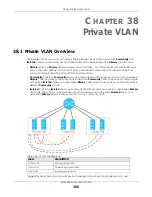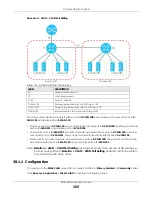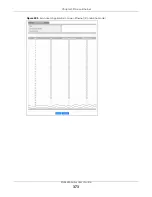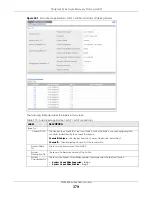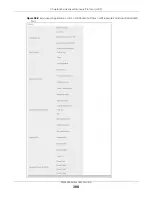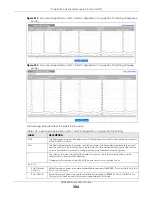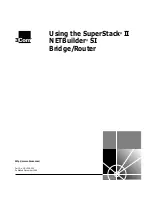
Chapter 40 Link Layer Discovery Protocol (LLDP)
XGS4600 Series User’s Guide
382
The following table describes the labels in this screen.
Table 171 Advanced Application > LLDP > LLDP Local Status > LLDP Local Port Status Detail
LABEL
DESCRIPTION
Local Port
This displays the number of the Switch’s port.
Basic TLV
These are the Basic TLV flags
Port ID TLV
The port ID TLV identifies the specific port that transmitted the LLDP frame.
•
Port ID Subtype
: This shows how the port is identified.
•
Port ID
: This is the ID of the port. In stacking mode, the first number represents the slot and
the second the port number.
Port Description
TLV
T
his displays the local port description.
Dot1 TLV
Port VLAN ID
TLV
This displays the VLAN ID sent by the IEEE 802.1 Port VLAN ID TLV.
Port Protocol
VLAN ID TLV
This displays the IEEE 802.1 Port Protocol VLAN ID TLVs, which indicates whether the VLAN is
enabled and supported.
Dot3 TLV
MAC PHY
Configuration &
Status TLV
The MAC/PHY Configuration/Status TLV advertises the bit-rate and duplex capability of the
sending 802.3 node. It also advertises the current duplex and bit-rating of the sending node.
Lastly, it advertises whether these setting were the result of auto-negotiation during link
initiation or manual override.
•
AN Supported
– Displays if the port supports or does not support auto-negotiation.
•
AN Enabled
– The current auto-negotiation status of the port.
•
AN Advertised Capability
– The auto-negotiation capabilities of the port.
•
Oper MAU Type
– The current Medium Attachment Unit (MAU) type of the port.
Link
Aggregation
TLV
The Link Aggregation TLV indicates whether the link is capable of being aggregated,
whether the link is currently in an aggregation, and if in an aggregation, the port
identification of the aggregation.
•
Aggregation Capability
– The current aggregation capability of the port.
•
Aggregation Status
– The current aggregation status of the port.
•
Aggregation Port ID
– The aggregation ID of the current port.
Max Frame Size
TLV
This displays the maximum supported frame size in octets.
MED TLV
LLDP Media Endpoint Discovery (MED) is an extension of LLDP that provides additional
capabilities to support media endpoint devices. MED enables advertisement and discovery
of network policies, device location discovery to allow creation of location databases, and
information for troubleshooting.
Capabilities TLV
This field displays which LLDP-MED TLV are capable to transmit on the Switch.
• Network Policy
• Location
• Extend Power via MDI PSE
• Extend Power via MDI PD
• Inventory Management
Device Type
TLV
This is the LLDP-MED device class. The Zyxel Switch device type is:
• Network Connectivity

